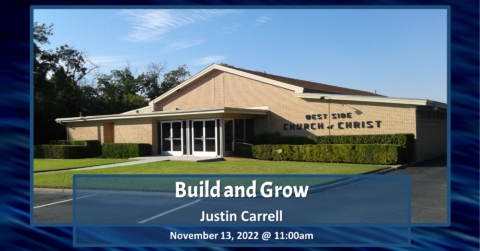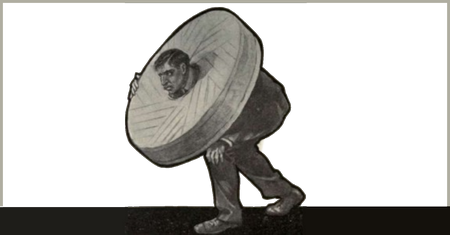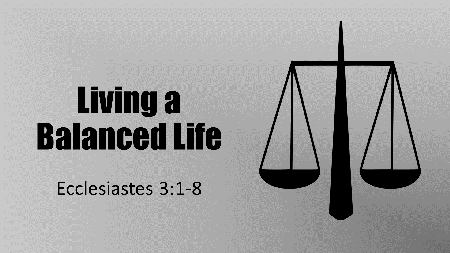Category: Christian Living
Subject: Christian Living
What Does it Mean to be a Man?

There are many ideas of what it means to be a “real man.” They conflict with one another, and are heavily dependent upon culture, peers and self-identity.
Does being a man indicate a willingness to fight, an abundance of testosterone, aggressiveness, physicality? Some say so. Does being a man require feelings of superiority, dominance, and misogyny? This seems common as well. Continue reading “What Does it Mean to be a Man?” →
Marginalized

Our nation was founded upon what has been referred to as a Judeo-Christian ethic. This means the laws governing right and wrong that are a part of our nation have their origin in the moral standards of right and wrong found in the Bible. It doesn’t mean the founding fathers got it right, or even that they did a good job of applying the principles. In fact, the foundational principle upon which our government was established, “We hold these truths to be self-evident, that all men are created equal…”, was practically contradicted by the institution of slavery until January 1, 1863. But at the very least the United States has been respectful toward Christians. Continue reading “Marginalized” →
Religious Fundamentalism

Fundamentalism, as it pertains to religion, is defined as “a form of religion, especially Islam or Protestant Christianity, that upholds belief in the strict interpretation of scripture.” In our day, the term is typically used as a criticism. Note this quote from Wikipedia: “Depending upon the context, the label “fundamentalism” can be a pejorative rather than a neutral characterization, similar to the ways that calling political perspectives “right-wing” or “left-wing” can have negative connotations.
Such a characterization is understandable, as Islamic fundamentalists often use force in an effort to make the world conform to their religious views. As an example, the Iranian government has recently come under criticism for its response to women who do not conform to the fundamentalist views of modesty. A “morality police” actively cited and arrested women for their violation of the code, and at least 508 protestors have been killed and another 19,000 arrested in recent conflicts over the laws. Continue reading “Religious Fundamentalism” →
Sermon: Shrewd Sons of Light

We are to be selfless, and interested in others. But, interestingly, to act as Christians, fully devoted to God and your fellow man is a shrewd (prudent) thing to do. In effect, you are acting in your own self-interest!
Sermon Powerpoint View and Download:
<<———><><———>>
Sermon: Ask for the Old Paths

Every decision you make impacts your life, often spiritually. Ultimately you must decide whether to walk the Highway to Holiness or the Way of Destruction.
Sermon Powerpoint View and Download:
<<———><><———>>
Walk Worthy

In the New Testament, the phrase “walk worthy” appears three times, with a fourth, in Revelation 3:4, referencing some in Sardis described by the Lord, “who have not defiled their garments; and they shall walk with Me in white, for they are worthy.”
Such a walk should be the desire of every child of God. Fortunately, the texts do a good job of characterizing that walk, giving us insight. So how can we walk worthy of the calling to which we have been called as God’s children? Continue reading “Walk Worthy” →
Sermon: Build and Grow

Justin discusses the call to add to our faith and love by becoming more Christ like day by day.
Kindness and Respect to the Elderly
There is a short passage in 2 Samuel 19 about the blessing that David showed to an older man named Barzillai. The King had just survived the attempt of Absalom to usurp his throne. Men who had betrayed David had come to him to prostrate themselves in the hope that David would spare their lives. David’s mercy and kindness on this occasion is laudable. Shimei the son of Gera, and Mephibosheth the son of Saul were among those pardoned by the King. David said, “Shall any man be put to death today in Israel? For do I know know that today I am king over Israel?” (2 Samuel 19:22).
Barzillai the Gileadite was “a very aged man, eighty years old” (32). He was rich, and had helped the king with supplies during a stay in Mahanaim. David wished to repay Barzillai by bringing the man back to Jerusalem with him. Consider Barzillai’s response:
Sermon: Knowing God
Subjective Commendation
“For we dare not class ourselves or compare ourselves with those who commend themselves. But they, measuring themselves by themselves, and comparing themselves among themselves, are not wise” (2 Corinthians 10:12).
Why is it not wise to compare ourselves to other people? The answer is simple, other people are not the standard! This is a very subjective standard that serves to make people feel a bit better about themselves, but in no ways gives insight as to whether they are approved by God!
Take, as an example the Pharisee in Luke 18 who prayed, “God, I thank You that I am not like other men — extortioners, unjust, adulterers, or even as this tax collector” (11). Setting aside the numerous problems with the man (he was proud, dismissive, and certainly ignorant of the relative righteousness of the man to whom he compared himself), his relative worth in relation to others had no bearing on whether he was accepted by God!
Our Lord clearly said that the Pharisee was not justified. Which shows another problem with such comparisons, it tends to come from a place of pride. “I am not like other men — extortioners, unjust, adulterers, or even as this tax collector. I fast twice a week; I give tithes of all that I possess” (11-12).
Like Paul, we must recognize the foolishness of such comparisons. Instead, compare ourselves with God’s words, which shall judge us in the last day! (cf. John 12:48).
Click below to…
Sermon: Confidence in Purpose

While Paul was in prison, he knew he might lose his life. But, if he lived, his purpose in living was Christ, (cf. Philippians 1:19-26).
“Woe to Him”
On the matter of offenses Jesus said, “It is impossible that no offenses should come, but woe to him through whom they do come! 2 It would be better for him if a millstone were hung around his neck, and he were thrown into the sea, than that he should offend one of these little ones” (Luke 17:1-2). It can be said that Jesus is not happy with those who offend others.
But, what is it that Jesus refers to as an offense? The words is found a total of 15 times in the New Testament. In the KJV of the Bible, the term is translated offence (9x), stumbling block (3x), occasion of stumbling (1x), occasion to fall (1x), thing that offends (1x).
Thayer defines the term, (skandalon) – a trap, snare; any impediment placed in the way and causing one to stumble or fall.
So, Jesus frowns upon the one who would cause another to stumble or fall — that is, to sin against Him. It is bad enough when we ourselves sin, but if we lead others to sin, “woe to him”!
We should think of this when considering the proper attitude we should have toward those who teach error. When we think about teaching others ourself. When we consider how our actions will affect or influence others. As parents and grandparents as we consider our children and grand-children are watching us closely, and learning from our words and actions. Offenses will certainly come, but “woe to him through whom they do come!”
Click below to…
Glorifying God
The Bible clearly teaches that those who seek to please the Lord are expected to glorify Him. Some may not be fully aware of what that entails. First, consider a definition of the term. The Greek word doxázo is found numerous times in the New Testament, and is defined by Thayer in an illuminating way. It means “to praise, extol, magnify, celebrate.” It has the idea of holding the object in honor, and to “cause the dignity and worth of some person to become manifest and acknowledged.”
In 1 Corinthians 6:20 Paul wrote, “For you were bought at a price; therefore glorify God in your body and in your spirit, which are God’s.” Here we see the responsibility of the Christian, in response to His redemptive efforts on our behalf. Because of what He has done for us, we should praise Him, and celebrate His righteousness and preeminence.
“Things which are proper for sound doctrine”
The phrase that begins the second chapter of Paul’s letter to Titus is important. “But as for you, speak the things which are proper for sound doctrine” (2:1, NKJV). Here are a few other versions: “But speak thou the things which befit the sound doctrine” (ASV); “But as for you, teach what accords with sound doctrine” (ESV); “But speak thou the things which become sound doctrine” (KJV). Consider the word used in each version to translate the Greek phrase (hos prepo): which are proper for; which befit; what accords with; which become.”
The word (prepo) is defined by Thayer as: to be becoming, seemly, fit (as it is used in our context).
So what did Paul tell Timothy to say to the disciples, things which would be becoming to, to be seemly or appropriate, as it regards sound doctrine or teaching? Interestingly, his words were about the characteristics and actions of those who belong to the Lord.
Continue reading ““Things which are proper for sound doctrine”” →
Sermon: Living a Balanced Life
The wise man in Ecclesiastes establishes the importance of living a balanced life (cf. Ecclesiastes 3:1-8). The only way this is possible is by having Christ at the center of your life.
Sermon Powerpoint View and Download:
<<———><><———>>











